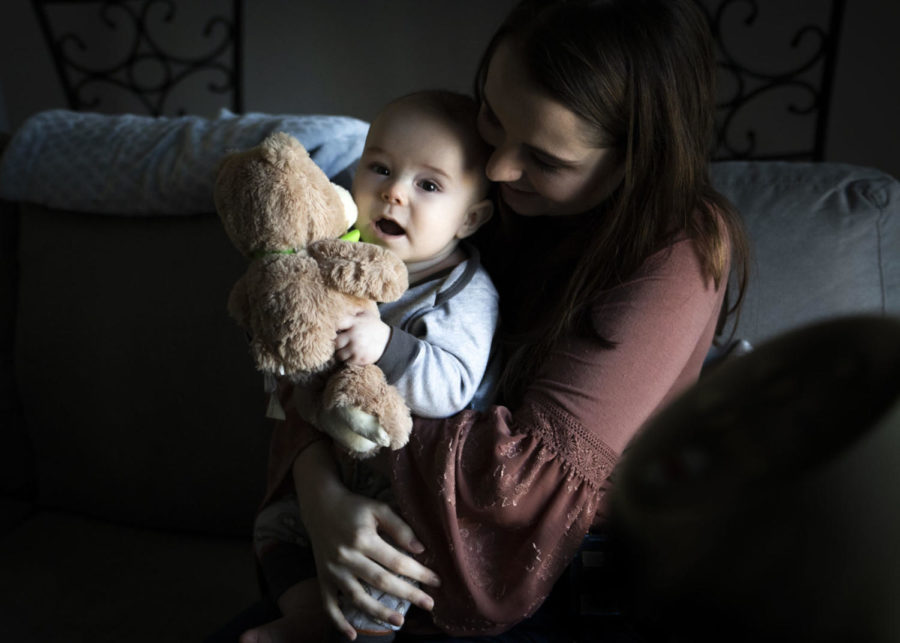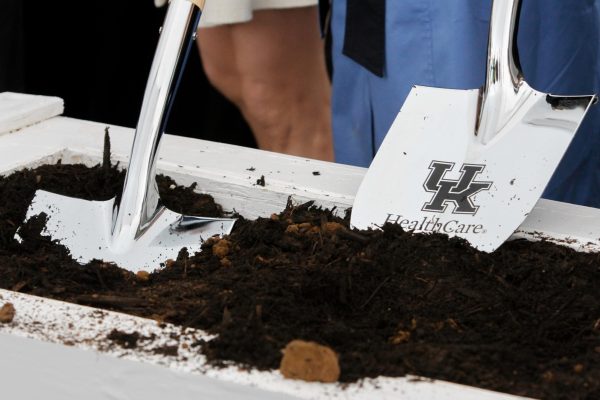Babies and Backpacks: How some students at UK manage student life and parenthood
April 9, 2019
When you add daycare, dirty diapers and pumping to the demands of college social circles and party life, internships and extracurricular activities, it’s hard to imagine the balance required to succeed at both.
There are some University of Kentucky students who manage it, though. For them, balancing parenthood and college life is far from easy, but they agree that it’s something they have no regrets over. It’s just that much harder for them to feel like they belong, to keep their college friends and to be true to themselves, all while caring for a child.
Four parents in this community of student-parents agreed on one thing: They haven’t found enough resources at UK to help them through this time in social and emotional capacities. UK has multiple financial assistance options for this very demographic, many wet rooms on campus for nursing mothers and a few daycares near campus, but these parents have felt a lack of social and emotional support.
Some felt ostracized by the fact that they’re in different stages of life than most college students and, because of their lack of party life, felt like they weren’t really part of the UK family. They lost friends. They’ve felt alone. They have turned to resources on campus and found a welcoming community, but they wish UK did more.
WATCH: Babies and Backpacks video
Several of them suggested that UK have an established support group that provides a space for both student-parents and their children to come and fellowship. They suggested any established program from a fun activities group to study groups welcoming of children to a space to share with people who are in the same stage of life. Another popular suggestion was the popularization of online alternatives to upper division classes, the lack of which have held some back in their efforts to earn a bachelor degree in four years.
All agreed that the real support system that exists at UK right now comes in the form of professors, classmates and TA’s who go and have gone the extra mile to check up on them, support them and encourage them through the balancing act that is their lives.
These are the stories of some members of a “hidden community” on campus, as one mother put it. For them and others like them, “it’s easy to feel alone.”
Clara Woods: ‘It’s true when they say that it takes a village.’
As a sophomore foreign language major at UK, Clara Woods found out that she and boyfriend Henry were going to be parents. At the time, they’d only known each other for a year and hadn’t planned to start a family.
She thought about terminating the “game changer” pregnancy.
“Only because of the idea of ‘People are going to judge me on campus. I’m not gonna fit into anyone in college,’” she said.
At that early time in her pregnancy, she felt it would be weird for her, and that people would perceive her as a mom taking classes and not as a college student who was a mom.
Woods decided instead to embark on the adventure of motherhood, and she cited the overwhelming support of her and Henry’s families as the reason she was able to do so. She and Henry stayed together and now work hard to pursue school and raise their son. She credits their ability to do this to the huge familial support both of them have. When she first told her parents she was pregnant, she said she didn’t know what to expect. She remembers her mom’s words: “I’ll be supportive with whatever you decide.”
Beau is now a 13 month-old ginger with bright blue eyes and a curious nature. His love for his parents is evident in the way he chatters at them and smiles at everything.
While this life that Woods has with Beau is something she said she wouldn’t trade for the world, it was a difficult road to decide upon. She said she lost many friends when she decided to keep her baby, and the college partying life was taken away before she could really be immersed in it.
“I have a really difficult time trying to juggle all of these things,” Woods said.
Unlike other students, she not only has to miss class when she’s sick, but when her baby’s sick, too. She said sometimes just managing her responsibilities to care for Beau and get her homework done at the same time is a huge challenge.
Though Woods and the other parents the Kernel spoke to cite their professors as their key vein of support at UK, Woods admitted that it’s still hard to always justify her needed absences from class, making classwork much more challenging.
It helps that both her and Henry’s parents have been supportive of their decision to keep Beau. They both take morning classes and Woods works from her parents’ home, giving piano lessons every night except Thursday. Henry, also a student at UK, works at Providence Montessori School as an after-school teacher.
“UK struggles with broadcasting that there are other college moms on campus,” Woods, whose father Timothy is a professor at UK, said.
She said she wished UK provided a support group for moms, “as a way for you to not feel so lonely on campus. A way for you to feel like there are others going through the same situation as you”–a situation she described as a “stuck” point between an identity as a college student and an identity as a mom.
“It’s true when they say that it takes a village.”
Desiree Cross: ‘This is God’s plan for my life’
As a senior at UK, broadcast journalism major Desiree Cross flew to Santa Monica, California, in the summer of 2017 to pursue her dream of being an international model. But it didn’t go exactly as she planned. Just before she left, she found out she was pregnant.
She took several tests and confirmed an unplanned pregnancy that she said made her feel confused and ashamed. So she didn’t tell anyone. Not her professors or friends or even some family members. Even her brothers and sisters didn’t find out until she was seven months along.
“I was so ashamed,” she told the Kernel.
She did reach out to her mother for advice.
“I just bawled my eyes out.”
Her mom encouraged her to be strong and embrace her new chapter in life, and convinced her that the baby she carried was God’s plan for her and a blessing in her life.
“He very much turned out to be,” she said. She took her mother’s advice and ran with it, but it was a difficult beginning. “I thought that I was about to start my life.”
Instead of the modeling contract she hoped for, Cross worked a full time job in California to prepare for her child.
“I didn’t leave any time to party,” she said. “I felt like I didn’t have time for that…. I have something else to focus on.”
She described those early months of her pregnancy alone in California as the “hardest time of my whole life.” It was her first time moving far away on her own, and she’d put so much work into it. It should have been the best time, she reminisced. But the whole experience was shrouded in nervousness, anxiety and fear.
“I had all these goals about when I did become a mom in the far future, but it was so near.”
She returned to Lexington at the end of the summer six-and-a-half months pregnant and ready to finish her degree at UK. She got back in town the day that school started and concealed her pregnancy throughout the semester.
Ace was born Dec. 5, 2017, just after his mom had scrambled to finish all her finals early, much to the surprise of her professors who, up until that point, had not suspected her pregnancy. Cross went part time during the spring 2018 semester to adjust to her new life as a mom, and entered her second senior year in the fall of 2018.
Ace, now over a year old, is already trying to throw a full-sized basketball that’s bigger than he is around his mom’s apartment.
Her life now is incomparable to her college life before motherhood, she said. Her goals of being an international model and working with a pro NBA team in her capacity as a journalist haven’t changed, but balancing her own needs and Ace’s has been hard. She struggled to come to grips with placing him in daycare, but ultimately realized it was necessary if she was going to be able to nurture her own needs and goals.
Cross said the support of her mother, the support network she has at One Parent Scholar House–where she lives and connects with other “girls like me”– and her faith have helped her persevere through the challenges she has faced.
“I have so much faith,” she said.
Her church, Growth Point in Lexington, has been her rock, and her faith in God has been what’s kept her going.
“This,” she said, “is God’s plan for my life.”
She’s found some support at UK in the form of supportive professors like Kakie Urch, an associate professor of multimedia, who Cross said was “such a blessing to me” and who texted her frequently to check on her and Ace.
“She let me know that I wasn’t in it by myself.”
She also found financial wellness support at UK in the form of scholarships geared toward parents. But, she said, she wishes UK had a better in-house social support system that could help provide space for student parents and their children alike to hang out and have fun.
Despite this lack of social support on campus, Cross doesn’t have regrets. She will graduate in May from UK with her bachelor’s degree and is excited for her future with Ace. She gets a lot of messages from girls who ask her for advice on being a student parent, and she tells them to “be strong.” Her already motivated self now works not just for her own future, but for Ace’s.
“I found so much hope in God,” she said. “I just tried to tell myself, ‘This is your journey. God brought you a blessing. Everything’s gonna work out.’”
Michael Maloney: “People have a tendency to look at single dads as superman. They tend to view the father’s involvement as optional, which I don’t think it should be.”
UK biology senior Michael Maloney is one of only four fathers who have primary custody of their children at One Parent Scholar House.
When he first started at UK fresh out of high school, he said the only thing he got out of his first college semester was his daughter Lilah, now 5. He moved to community college classes, including Bluegrass Community and Technical College, where he earned an Associates of Science degree. He took a year off and then came back to UK to pursue biology. He will graduate in December and then participate in a one-year teaching program through UK.
He hopes to someday teach high school biology and is passionate about teaching because he enjoys getting people interested in learning.
“I feel like there’s a chance to make a difference in somebody’s life,” he said. “I feel like if you have a teacher who’s genuinely interested, passionate about what they’re teaching, you can get the kids on track and make an impact.”
When Maloney and Lilah’s mom split when Lilah was 3, the plan was to share 50-50 custody of their daughter. However, it fell to him more and more often to care for her, until he finally became the primary caretaker. Her mother is more involved now, Maloney said, and joint parenting is now something they have begun to explore.
Despite this new arrangement, in which Lilah’s mother sees her one to three times weekly, Maloney has been primarily responsible for his daughter’s upbringing, and spoke to the cultural norms that don’t expect caretaking from men.
He spoke about the traditional gender roles that define our society’s expectations.
“The woman, historically, is expected to take care of the kids, or in the past, stay home primarily while the man goes out and does whatever, which is definitely changing in huge ways.”
Among the change he sees is that now, courts are more likely to consider both the father and mother in a custody battle and lean toward 50-50 instead of merely giving the mother custody. He also sees a positive change in the amount of representation afforded fathers who seek custody of their children.
As for this expectation and the more normalized trend of children going with the mother and not the father after a breakup, Maloney said he feels people are much harder on single moms than single dads.
“People have a tendency to look at single dads as superman,” he said. “They tend to view the father’s involvement as optional, which I don’t think it should be.”
He said when people hear he is a father, they assume that the child lives with the mother or that he’s a “weekend dad.”
“When I say ‘Actually, she lives with me,’ they seem shocked. Nobody really expects that.”
He said he feels a lot of people respect single fathers more than single mothers. While he feels many people view a father’s position as an optional thing, he said they still see the mother’s as her job and tend to look down on them more, while simultaneously respecting single fathers for going an extra mile.
As for Maloney, this is his whole life. Having become a father at 19, being a dad has shaped his adult life, worldviews and self-perspective.
But, he tells himself and others that, “Nothing’s gonna be picture-perfect. There are gonna be nights where neither of you gets enough sleep and you’re both exhausted when you go to school in the morning…”
But, as long as the parent remains the “stabilizing factor” in the child’s life and is true to his or her goals, he said, it’ll all be fine.
Mikayla Mitchell: “I don’t mind doing this alone with Judah”
After four years with her boyfriend of the time, junior economics major Mikayla Mitchell found out she had an unplanned pregnancy in December 2017.
“It’s been a long journey since then,” she told the Kernel.
She’s had familial support, but she’s been alone in her parenting efforts.
The news of her pregnancy was just in time for her transfer to UK from Miami of Ohio after spending her freshman year there as a political science major to UK, near her family. Like others in her shoes, she was surprised and apprehensive at the news.
“I immediately knew everything was gonna change if I decided to go through with it,” she said.
She found support through Assurance, a specialized health clinic in Lexington that seeks “to empower individuals to consider beneficial options for pregnancy and sexual health,” according to their website. These options include parenting, adoption and abortion. For Mikayla, it was support for parenting.
Judah Mitchell’s dad still hasn’t met him.
But, Mikayla has been busy. From the time she found out she was pregnant, she began researching resources for college and school moms. From there, she found an entire community of moms in school who were “making it work.”
“I love being a mom,” she said. “I feel like it’s what I was meant to do. I love being a working mom.”
It’s forced her to have more responsibility. Before having a baby, she said she had little responsibility. Now, “the steaks are very high.”
She’s had to rely on online classes to finish her degree, and said UK has a shortage of viable options for someone in her shoes.
“I’ve almost run out of the classes I can take online, which is kind of scary,” she said. “Then I’ll have to take classes on campus. I haven’t really figured out how that’s gonna work.”
This semester, she’s taking B&E 397, an internship seminar that allows her to work in Frankfort as a legislative assistant for the house minority leadership, the house minority leader, the caucus chair and the minority whip while completing credit hours simultaneously. She works full time, getting up in the early hours of the day to dress Judah, take him to daycare and head to Frankfort where she handles travel arrangements, legislation research and constituent correspondence.
She said the experience has removed a lot of her social life, but “it’s kinda strengthened my best friendships because I found out who was really there for me.”
Though she misses the carefree college life she used to have, these remaining friendships she has are “based on substance.”
Her role as a mom and her love for her job in the state capital work well together. In fact, the politicians in her office provide her with space for pumping in their offices, which she has to do every few hours, and gifted her a sign for the door that says, “Please wait, nursing mom at work.”
She sometimes brings Judah to work with her in the capital, not because he’s old enough to remember it, but because she believes strongly in the importance of instilling civic responsibility into his upbringing.
It’s her way of showing that she’s not only a successful student and woman, but a good mom.
“I think it’s kind of a hidden community,” she said of the college students who are parents.
She said on campus, she feels like you only see the traditional students who live on campus, don’t have kids and are there for four kids.
“It’s easy to feel alone,” she said. “Like you’re the only one who’s not a traditional student.”




















































































































































